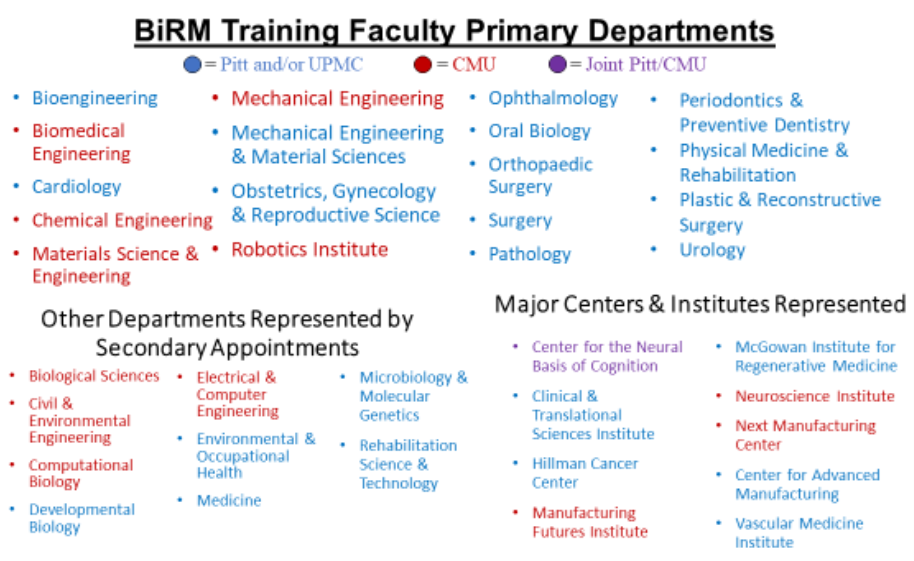T32 Biomechanics in Regenerative Medicine (BiRM)
What is BiRM?
The Biomechanics in Regenerative Medicine Program is unique in its goal to integrate multi-scale biomechanics - including theory, modeling, simulation, experimental method design, mechatronics, robotics, AI, and advanced manufacturing - as applied to regenerative medicine. The goal of this training program is to prepare the next generation of biomechanists to tackle the mounting challenges facing healthcare – to efficiently translate scientific discoveries in contemporary cell and molecular biology into safe and effective therapies. This is accomplished via a highly coordinated and mentored interdisciplinary training program with a combination of required and elective courses, research activities, and specialized training opportunities.
The Training Program incorporates faculty from the Departments of Bioengineering, Cardiology, Mechanical Engineering & Material Sciences, Obstetrics, Gynecology & Reproductive Science, Ophthalmology, Oral Biology, Orthopedic Surgery, Surgery, Pathology, Periodontics & Preventive Dentistry, Physical Medicine & Rehabilitation, Plastic & Reconstructive Surgery, Urology, and the McGowan Institute for Regenerative Medicine of the University of Pittsburgh, as well as faculty from the Biomedical Engineering, Chemical Engineering, Materials Science & Engineering, and Mechanical Engineering Departments of Carnegie Mellon University. Their expertise spans a full spectrum from highly theoretical to computational to experimental to applied/translational.

This combination of training faculty research interests and coursework will provide a rich educational experience and more numerous training opportunities for the students than could be obtained within the individual university departments. Moreover, the breadth of research areas that span various physiological systems (cardiovascular, musculoskeletal, dental, ophthalmic, urologic, gynecologic, neural) allows for a unique opportunity to train students to become highly skilled problem solvers while avoiding over specialization.
Since the BiRM training program is not central to any one department, this permits the trainee a much wider choice of options with which to pursue a PhD with foci in both biomechanics and tissue bioengineering/regeneration. In the current paradigm of graduate education, a PhD student in one department that wishes to perform thesis research in a laboratory in another department finds many departmental based administrative roadblocks in his/her path. The BiRM program eliminates these roadblocks and permit highly relevant and specialized educational and research options for its trainees.
Current Participating Faculty
University of Pittsburgh
- David Vorp, PhD, PI
- Savio L-Y. Woo, PhD, DSc, DEng, Co-PI
- Steve Abramowitch, PhD
- Alejandro Almarza, PhD
- Stephen Badylak, DVM, PhD, MD
- Michael Boninger, MD
- Bryan Brown, PhD
- Lance Davidson, PhD
- Mo Ebrahimkhani, MD
- Giuseppe Intini, DDS, PhD
- Kang Kim, PhD
- Katrina Knight, PhD
- Pamela Moalli, MD, PhD
- John Pacella, MD
- Anne Robertson, PhD
- Peter Rubin, MD
- Warren Ruder, PhD
- Charles Sfeir, DDS, PhD
- Sanjeev Shroff, PhD
- Ian Sigal, PhD
- Tatum Tarin, MD
- Gelsy Torres-Oviedo, PhD
- Edith Tzeng, MD
- Kenneth Urish, MD, PhD
- Jonathan Vande Geest, PhD
- James Wang, PhD
- Justin Weinbaum, PhD
- Ioannis Zervantonakis, PhD
Carnegie Mellon University
- Keith Cook, PhD, Co-PI
- Rosalyn Abbott-Beauregard, PhD
- Christopher Bettinger, PhD
- Phil Campbell, PhD
- Tzahi Cohen-Karni, PhD
- Adam Feinberg, PhD
- Noelia Grande Gutiérrez, PhD
- Eni Halilaj, PhD
- Jana Kainerstorfer, PhD
- Philip LeDuc, PhD
- Carmel Majidi, PhD
- Xi Ren, PhD
- Cameron Riviere, PhD
- Rebecca Taylor, PhD
- Yu-li Wang, PhD
- Victoria Webster-Wood, PhD
- Jessica Zhang, PhD
BiRM Curriculum
General Courses
| Biomechanics (BIOMECH) Track | Tissue Engineering and Regenerative Medicine (TERM) Track |
|---|---|
|
Applied Biostatistics (BioE 2525) * |
Applied Biostatistics (BioE 2525) * |
|
Methods in Applied Math (Math 2950) * |
Methods in Applied Math (Math 2950) * |
|
Societal, Political and Ethical Issues in Biotechnology (BioE 2241) * |
Societal, Political and Ethical Issues in Biotechnology (BioE 2241) * |
|
General Science/Engineering Elective 1 |
General Science/Engineering Elective 1 |
Life Science Courses
| Biomechanics (BIOMECH) Track | Tissue Engineering and Regenerative Medicine (TERM) Track |
|---|---|
|
Molecular Cell Biology & Biophysics I (BioE 2520) |
Molecular Cell Biology & Biophysics I (BioE 2520) |
|
Life Science Elective 1 |
Life Science Elective 1 |
|
Life Science Elective 2 |
Life Science Elective 2 |
Related Courses
| BIOMECHANICS (BIOMECH) TRACK: Biomechanics Related |
TISSUE ENGINEERING AND REGENERATIVE MEDICINE (TERM) TRACK: TERM Related |
|---|---|
|
Biomechanics 4: Biomechanics of Organs, Tissues, and Cells (BioE 2633) |
Introduction to Tissue Engineering (BioE 2620) |
|
Biomechanics Elective I* (BioE 2067 or 3025) |
TERM Elective 1* (BioE 2810 or 2075) |
|
Biomechanics Elective 2* (BioE 2081 or BioE 2721) |
TERM Elective 2* (BioE 2220 or 2540) |
| BIOMECHANICS (BIOMECH) TRACK: TERM Related |
TISSUE ENGINEERING AND REGENERATIVE MEDICINE (TERM) TRACK: Biomechanics Related |
|---|---|
|
TERM Course 1 ** |
Biomechanics Course 1 *** |
|
TERg Course 2 ** |
Biomechanics Course 2 *** |
*Or equivalent - Prior permission required
** Any course from the TERM Track
*** Any course from the Biomechanics Track